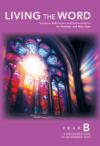Scripture Study for
Twenty-First Sunday in Ordinary Time
Isaiah 66:18–21 / Mark 16:15 / Hebrews 12:5–7, 11–13 / Luke 13:22–30
<< Back to LECTIONARY RESOURCES
Understanding the Word
By Br. John R. Barker, OFM
The reading from Isaiah comes at the very end of the book and stems from the postexilic period. Small, poor, weak, and ruled now by Persia, the promise of a glorious future for Jerusalem and Judah seems impossible. God’s people themselves have been scattered all over the known world. In response, God assures them that soon God will gather all the nations to Jerusalem to worship (i.e., see God’s glory). Among them God will set a “sign,” prophetic messages or messengers, who will go out to other nations and bring them to worship God. As well, they will summon back all the dispersed of Israel. Just as one brings gifts for God to the temple, so the returned Israelites will be an “offering,” or gift, for God.
The author of Hebrews continues his exhortation to persevere in faith by resisting sin so as to receive the promises of God. The struggles, whether external or internal, of the Christian life may be thought of as divine discipline, allowed or sent by God to bring each person to spiritual maturity. Even if this discipline may at times be conceived as punishment, it should be understood in the same way parental discipline is, as an ultimate benefit for the child, as painful as it may be at the time. Just as children who have not been spoiled mature into well-adjusted adults (ideally), so Christians who are disciplined in their pursuit of holiness find, over time and struggle, that their weaknesses (lameness) are healed, rather than being the source of their downfall.
